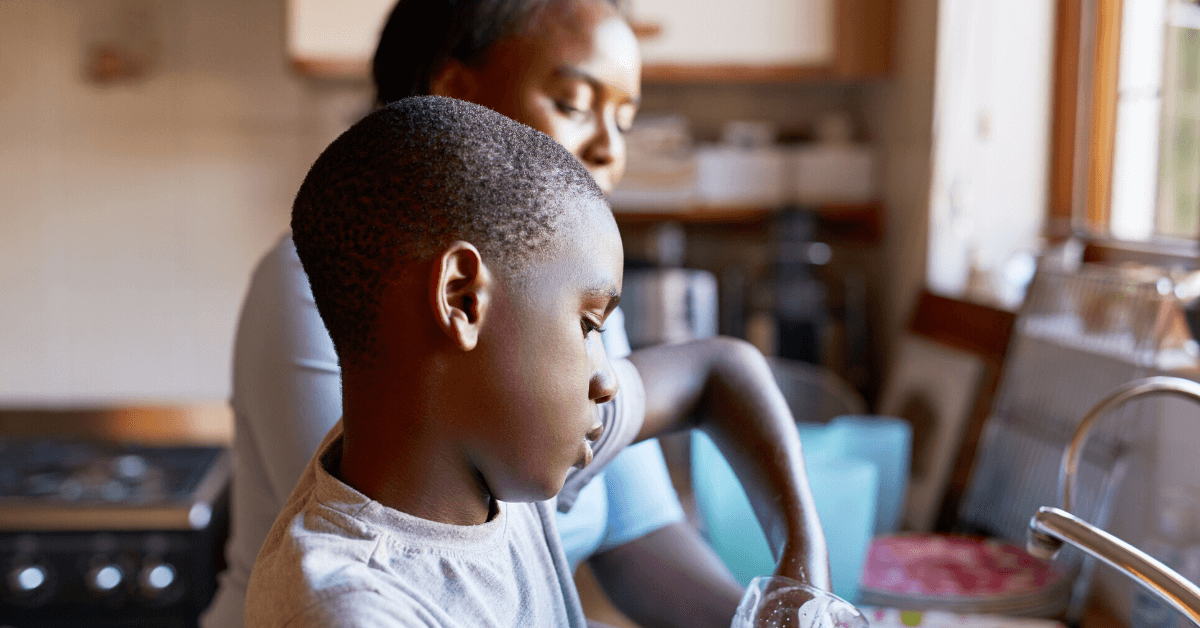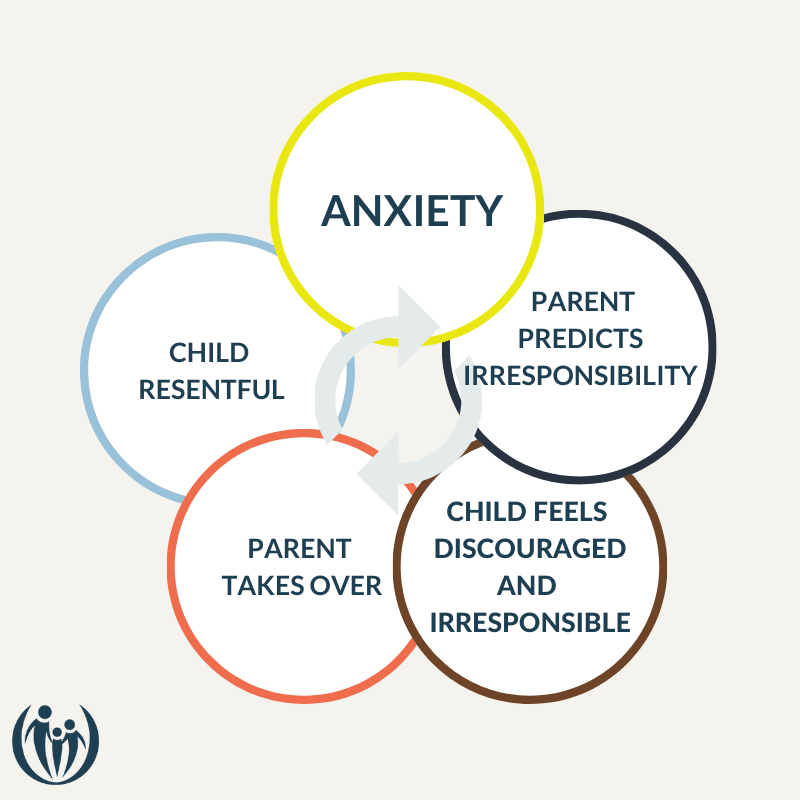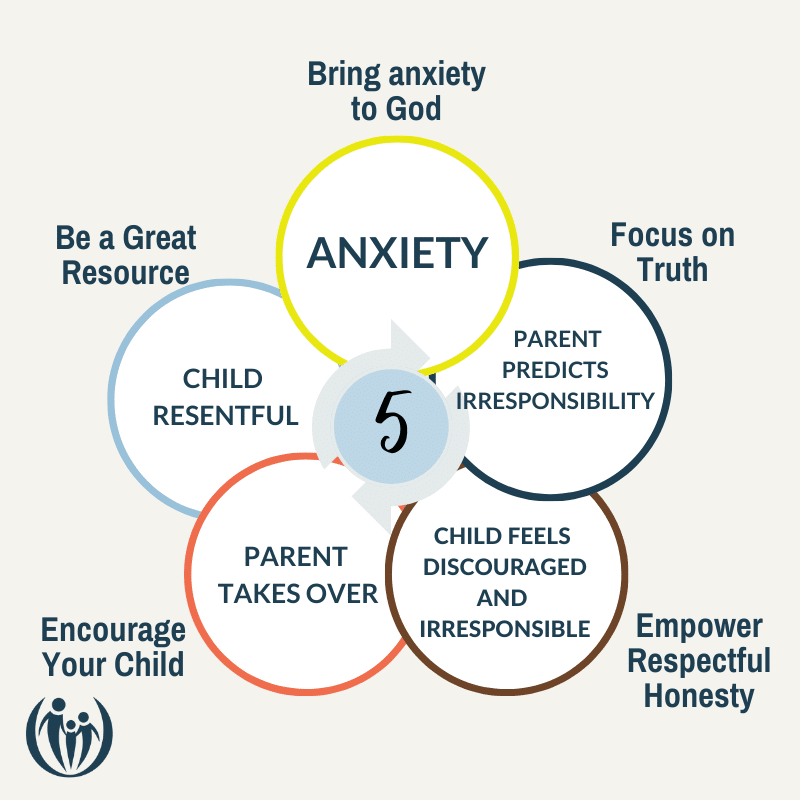
Are You Micromanaging Your Kids? This Is How to Stop

Are you micromanaging your kids? When you get to feeling anxious in your parenting, it’s so easy to grasp at the things you think you can control. Maybe your child isn’t making the best choices and you’re scared of what will happen, but your micromanagement response pushes your child further away. It’s such an easy trap to fall into!
Anxiety and control are partners in crime in parenting. Parental anxiety and micromanagement rob you of joy, contentment and peace. They rob your kids of encouragement and independence. In my own parenting, and as I’ve coached countless parents, I’ve noticed the spiraling impact of parental anxiety and control.
Will my kids choose good friends? Will they do well academically? Will they make wise choices when I’m not around to guide them? It’s normal to consider questions like these. However, if you feel the answer is “no” to any of those reflective questions, anxiety can begin to rise. And that’s when so many of us will start micromanaging our kids.

Control is your brain’s natural coping response. When you feel internally out of control, your brain wants you to take charge of the situation, so you can feel less anxious.
This kind of reaction is problematic for parenting. Why? Because you cannot parent from wisdom when your brain is stuck in an anxiety-control pattern.
(Imagine how it would feel to have a boss at work notice a drop in your performance and then respond by anxiously reading your emails and checking every report!)
The cycle of anxiety and micromanagement
The more I parent from a place of anxiety, the more likely I am to project a negative future for my kids. That in turn makes it more likely they are going to begin living out that projection.
As they live out my negative projections, I rationalize doing things for them that they ought to be responsible for themselves…
Which builds their resentment and resistance towards me…
Which feeds my anxiety…
And the cycle goes on and on…
The cycle of anxiety and micromanagement might look something like this:

When you micromanage the unmotivated child
Ever met a child like this?
- Has a hard time getting out of bed in the morning
- Is disinterested in school
- Struggling academically
- Resists chores and responsibilities
- Doesn’t care if their bedroom is unmanageably messy
- Only gets excited about screen time
It is the perfect storm for parental anxiety and micromanagement. If you’re seeing this in your child, it’s hard not to project into the future!
You might fall into coaxing, bribing, nagging, yelling, and constant reminding.
If you’re not sure whether you’re falling into micromanaging your kids, check the language you use. Often there are words of ownership in the problem like, “We need to get to school on time today. We are going to be late.” (We are going to be late for school? Who really owns this problem?)
By the time you get to this place in the relationship, especially with a teen, resentment has mostly likely built up. Extracting yourself from this cycle is neither easy nor painless. But it is possible. It’s also necessary for the long-term health and well-being of your child.
5 tips (exit strategies) to STOP micromanaging your kids
Picture the cycle above as a traffic roundabout on which you travel faster and faster the longer you’re on it. Then imagine the exits that you can take with a little thoughtfulness:
1. Bring your anxiety to God, not to your child.
When you need your child to act a certain way, reflect why. One dad was harsh about his son’s disastrous bedroom. He equated his son’s messy room, complete with drawers hanging out as a sign that he had failed as a dad. His plaguing thought was, “If Jason can’t even push in a drawer, how will he ever be able to hold a decent job?”
Are you giving your kids control over your sense of value and even your identity as a mom or dad? Change starts with honest introspection:
- When my child has a good day and gets a decent grade do I feel more confident about my parenting?
- When my child barely rolls out of bed, forgets his backpack, and flunks a test do I lose it??
This power over your mood is way too much responsibility for kids to handle.
Consider: “How can I be okay even if my teen continues to struggle?” A helpful phrase to remember: “My child is not my report card. Jesus is my report card.”
And by the way, Jesus loves both of you – I Peter 5:7 says, “Cast all your cares on him, for he cares for you…” and for your child!
2. Focus on the truth about your child.
Ask God how he sees your child. Does God see her as a messed up, hopeless cause? The answer is probably vastly different from your current view. Repeating truth-filled phrases changes our beliefs. Changing our beliefs, in turn, changes our thinking, feeling and actions.
Here’s a truth you could try telling yourself: “If my child fails this class [or keeps a messy room], he will grow and learn and have an opportunity to do better in the future. I will have an opportunity to communicate truly unconditional love.”

3. Empower respectful honesty.
One mom of teens was a self-described micromanager about chores and general responsibility. She admitted it and told her kids that she was working to let them be responsible for their lives. She also equipped them with a simple, respectful script to confront her when she slipped into old habits: “Mom, I’m feeling micromanaged right now.” This prompted her to do a “do-over” in the interaction and helped her kids to take responsibility for their lives.
4. Encourage your child!
Make an extra effort to connect in ways your child enjoys, in spite of difficult behavior. Find things to affirm: What is your child doing well? What is she good at? When do you see him excited about something?

5. Be a great resource for your child.
But without taking over their responsibilities.
This takes skill and communication. It’s tempting to go to the other extreme with a response like,: “FINE. I’m not going to do this for you anymore. I’ve done my best, but you obviously don’t want my help.”
That’s not what your child needs either.
Ask questions like:
- What do you need from me to be successful in getting your chores done [or getting out of bed]?
- How would you like to communicate with me about school? As a parent coach, I generally recommend a once-per-week check-in that is for information purposes for the parent. (Not a weekly lecture time!)
Related Posts
Don’t give up on your relationship with your child
It’s so easy to get stuck on the parental anxiety-micromanagement cycle. You get on it because you want to help so badly, but it quickly becomes discouraging to both you and your child. However, if this describes you there’s plenty of hope. You can exit the crazy cycle and learn to communicate your love and confidence in your kids.
As you do, you’ll strengthen your relationship and build true respect with them. And you just might see them become more responsible!
Apply it now
- Where do I most need to exit one of the off-ramps from the micromanagement diagram above?
- What are some practical ways I can stop micromanaging my kids?
- How could I remind myself of it when my kids are struggling?
If you want to learn more about the anxiety cycle we have a podcast that pairs nicely with this article. Check out “My Child is Afraid of Everything” for some more practical applications you can start using today!
In our online course, The Power of Questions: Less arguing. More wisdom., you will learn the art of asking questions that build internal wisdom and character in your kids and create a culture of teamwork in your family. Join us today!









